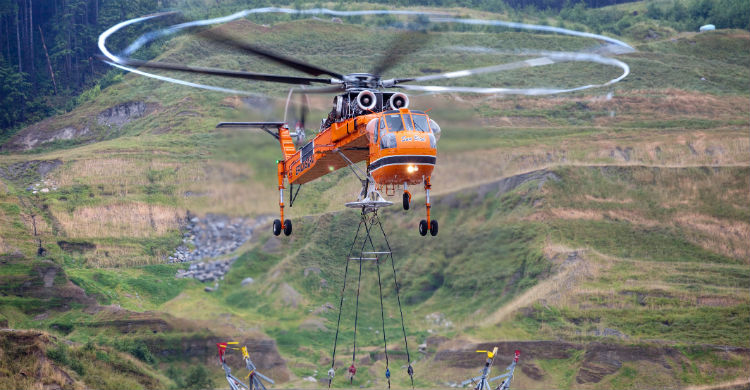Erickson: Spring time in Pangnirtung

In winter the temperature in Pangnirtung, an Inuit village, on Canada’s Baffin Island, can get down to below 50˚F (–50°C). With an average temperature of 0˚F (-17˚C) it is still pretty cold in Spring. So when a fire damaged Pangnirtung’s power plant in April it was a major issue for the 1,500 inhabitants.
There were emergency generators at Iqaluit International Airport 160 miles away. But no easy way to move them. So they called Erickson (formerly Erickson Air Crane). Within 48 hours one of its S-64 F Aircrane’s had been flown up to Canada and moved the generators. The heating could go back on.
Erickson specialises in operating in tough environments. In the last few years almost half of its sales have come from supporting US troops and international organizations in Afghanistan and Iraq. Now, as troops move out, it is looking for other contracts to help replace this revenue.
It already is one of the most diversified operators. As well as supporting troops, its missions include: aerial logging, fight fighting (protecting trees to be logged later), transporting oil workers, construction and oil exploration.
Speaking on a conference call this week, Jeff Roberts, Erickson’s CEO, who started two weeks ago from CAE acknowledged the challenges.
“As we look forward, we see long, solid opportunities in every one of our businesses.”
“As we look forward, we see long, solid opportunities in every one of our businesses,” said Roberts. “That said, the 2015 defence market is soft and competitive. The fire season has little visibility and significant seasonal risk in any given year. And as you know, the oil and gas vertical is currently under increasing pressure from lower energy prices.”
Although it is best known for its 19 heavy lift helicopters – 13 S-64Es and six S-64Fs – it has a diverse fleet of 28 medium and light helicopters and seven fixed wing aircraft. In 2014 heavy lift aircraft had 62.7% utilisation, other helicopters 45.5% and fixed wing 33%. (If you want to know the value of the S-64s, Erickson sold one S64 in a June 2014 sale and leaseback for $24.7 million.)
One of Robert’s first roles was announcing the results from the first quarter: an operating loss of $65.2 million, compared to a loss of $2.8 million in the first quarter of 2014. Adjusted EBITDA was $2.2 million. Erickson ’s $66.2 million revenue for its first quarter fell by $8 million (or 10.8%) compared to 2014.
The first quarter is typically Erickson’s weakest one.
In January, before he started, Erickson restructured into three divisions: government aviation services; commercial aviation services; and manufacturing and MRO. It is also cut a number of jobs.
In its first quarter of 2015 only maintenance sales were up – an impressive $7.0 million compared to $2.7 million. Maintenance was partly helped by a new Bell 214 support programme it has agreed with the OEM (Bell 214s were produced between 1970 and 1981). Erickson sees maintenance as its fastest growing business and likes supporting out of production aircraft.
Government revenues fell from $41.5 million last year to $33 million. Roberts said that they see modest opportunities in this area in 2015 but strong ones in the future.
Commercial aviation services sales – ranging from oil and gas, firefighting and heavy lift contracts – fell $26.3 million from $29.9 million. This difference was mainly because of fewer forest fires in Australia and Turkey (some of their fire contracts only pay out when the helicopter flies, but at a much higher rate than other contracts).
“There is a lot of market out there that we can go out and chase”
“There is a lot of market out there that we can go out and chase,” said Roberts. “It is about creating a robust and a rigorous front end organization to be able to block and tackle that and bring it in.”
As only arsonists can predict fires, forecasting is always going to be hard.
“We are going to control the factors we can and take action as necessary. We’re going to cast a wider net to find complementary business opportunities and operate the business with a clear focus and discipline on cash management,” said Roberts on the call. “I am confident that if we do those things and increase the tempo of operations and decision making, over time, we will demonstrate an ability to grow and drive significant value to all of our stakeholders.”
The warm people of Pangnirtung are definitely on Erickson’s side.
Subscribe to our free newsletter
For more opinions from Helicopter Investor, subscribe to our email newsletter.





